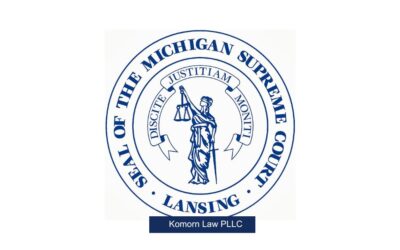Is the Michigan State Police really concerned about your DNA / biometric privacy?
Here’s what they say on their website
The Michigan State Police (MSP) is committed to protecting the privacy of your potentially personally identifiable data (PPID) in a strong and meaningful manner. Our privacy policy is designed to inform both members of the public and our employees about the PPID information we collect, how we use it, how we maintain it in our systems, under what circumstances you may access or correct your own information, and what we may disclose to others.
Biometric Identification Information
MSP may collect and use your biometric Information, including (but not limited to): fingerprint images, palm print images, iris images, digital images captured during your arrest or booking, and descriptive data associated with all images, identifying marks, scars, amputations, and tattoos, for identification and investigative purposes.
It may also require submission of biometric information for employment purposes. This information is protected, retained, and used in compliance with the Bureau of Criminal Identification and Records Act, Act 289 of 1925. This act also allows for data sharing between interstate, national, and international systems for criminal identification purposes.
Biometric Information may also be submitted voluntarily for specific programs, such as for identification of individuals with special health care needs, per the Fingerprinting Residents of this State Act, MCL 28.274.
DNA identification profile information may be collected, analyzed, indexed, and retained by MSP, as specified in the DNA Identification Profiling System Act, Act 250 of 1990. This act allows DNA profiles to be used for law enforcement identification purposes or to assist in the recovery or identification of human remains or missing persons. If personal identifiers are removed, it may also be used or shared for academic, research, statistical analysis, or protocol development purposes.
The following notice will be given to all individuals who provide a DNA sample (MSP FORM BID-016):
At the time a DNA sample is taken, please be advised:
(a) That, except as otherwise provided by law, your DNA sample or DNA profile, or both, shall be destroyed or expunged, as appropriate, if the charge for which the sample was obtained has been dismissed or resulted in acquittal, or no charge was filed within the limitations period.
(b) That your DNA sample or profile, or both, will not be destroyed or expunged, as appropriate, if MSP determines you are otherwise obligated to submit a sample or if it is evidence relating to another individual that would otherwise be retained under MCL 28.176.
(c) That the burden is on the arresting law enforcement agency and the prosecution to request the destruction or expunction of a DNA sample or profile as required under MCL 28.176, not on you.
Here’s what we say
Don’t talk to the police before, during or after your Miranda rights have been read without a lawyer present. If you do limit your information because what you say locks you into what you said. Just because you are not under arrest or being detained does not mean what you say will not be used against you.
Here is some information to review.
Don’t worry, a copy of your DNA has not been sent off to the Government Mountain Storage Facility for permanant storage out of view, or has it?
Legal Counsel and Your Rights
When facing legal challenges, particularly in criminal cases, it is advisable to seek legal counsel immediately.
An experienced attorney can provide guidance on how to navigate interactions with law enforcement while safeguarding your constitutional rights.
Since 1993 our expert legal defense in navigating criminal law matters and protecting your constitutional rights are what we eat for breakfast everyday.
Contact Komorn Law PLLC if you’re ready to fight and win.
Research us and then call us.
More Rights You Should Know

Michigan Crime Victim Compensation
Michigan has a crime victim compensation fund. You can contact them using the various links on this page. This post is just to provide you with information. We do not provide any services for this topic.Crime Victims Victims of crime often face lasting repercussions...

Supreme Court Opinion – Created federal agencies need judicial oversight
Summary of the Opinion in Loper Bright Enterprises v. RaimondoIn Loper Bright Enterprises v. Raimondo, the Supreme Court addressed the enduring precedent set by Chevron U.S.A., Inc. v. Natural Resources Defense Council, Inc., which has shaped administrative law for...
Other Articles
One of Michigan’s Top DUI Attorneys
We aggressively defend all aspects of traffic law, from simple civil infractions to more serious alcohol and drug-related offenses. Don't wait till the last second to get an attorney. That's how you lose.Why Attorney Michael Komorn is one of Michigan’s Top DUI...
Michigan DUI Laws and Consequences – Second Offense
Michigan DUI Laws and Consequences – Second Offense Operating Under the Influence (OUI) is a serious offense in Michigan. If someone is caught driving under the influence of alcohol or drugs, they can face severe penalties. When it comes to a second offense, the...
Federal Ban on Owning Firearms by Cannabis Consumers is Unconstitutional Court Says
Federal charges against a non-violent, cannabis-using gun owner were unconstitutional.A federal appeals court panel upheld a lower court's ruling on Wednesday, declaring that federal charges against a non-violent, cannabis-using gun owner were unconstitutional. “The...
AG Nessel joined 21 attorneys general to regulate the sale of firearms
Extreme Risk Protection Order to prevent individuals from possessing or owning a firearm for eight years following their conviction. That legislation was signed into law by Governor Gretchen Whitmer in November of 2023.Michigan Attorney General Dana Nessel has joined...
Michigan DUI Laws and Consequences – First Offense
First Offense DUI in Michigan: Laws and ConsequencesFacing a first offense DUI in Michigan can be daunting as the implications are significant and the legal landscape is complex. Understanding the laws surrounding Operating While Intoxicated is essential, as these...
Michigan Supreme Court to Hold Public Administrative Hearing
On September 18, 2024, the Michigan Supreme Court will conduct a public administrative hearing, providing an opportunity for citizens and legal professionals to engage directly with the state's highest court. This hearing, held via Zoom and livestreamed on YouTube,...
Nuclear waste headed to southeast Michigan landfill
What happened to the nuclear waste from the Manhattan Project? It's coming to Michigan so New York can be a cleaner place.August 2024, the U.S. Army Corps of Engineers is transporting nuclear waste from the Manhattan Project (Read it) to the Wayne Disposal facility in...
Video kept from family shows police force not drugs killed son
police and paramedics inflicted “inhumane acts of violence”A mother has filed a federal lawsuit claiming that, while her son was experiencing a seizure in his Tennessee apartment, police and paramedics inflicted “inhumane acts of violence” on the 23-year-old instead...
















